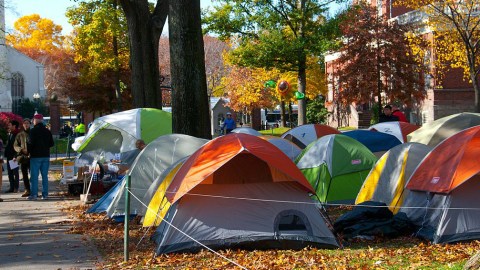58,000 College Students Are Affected by This Silent Epidemic

Photo credit: Mikki Ansin / Getty Images
There are certain myths about homeless people. We have our ideas of what they look like (grungy, dirty, smelly); how they got to be homeless (pretty sure it’s their fault); and what their lives have been like (drugs, mental illness, bad choices). And they certainly don’t have a college degree. Like most of the stereotypes we formulate to save us from having to actually humanize another person, this one has some inaccuracies. According to the Free Application for Federal Student Aid (FAFSA), in 2012-2013 there were 58,000 college students who reported themselves as homeless.
A homeless college kid? It sounds like a Sandra Bullock movie, where she finds a disadvantaged college student living on the streets and takes him in, helping him earn the first college degree in his family. Except, it’s not primarily kids coming from poverty that have this problem.
According to the Huffington Post, the “majority of homeless college students come from lower-middle-class families and do not have a history of homelessness or extreme poverty.” So then, who are these young people, and how did this happen? Often it’s students who have lost their job or whose parents have lost their job. With rising tuition costs and no or little income, students sleep in their cars or at the library, sometimes relying on friends to couch surf. They do their best to keep it secret. After all, recalling the aforementioned stereotypes, why would they want to admit their housing status to new friends or professors? Yet their grades often suffer, as does their social life. For students living at shelters, which have a curfew, there’s little of the “hanging out in your dorm room exchanging philosophies” or “playing Super Smash Bros. for hours” hallmarks that characterize college days. Attendance is affected, as are their confidence levels.
While homelessness sometimes seems like a problem exclusively for cities, more and more students are “living on the edge of a financial cliff, even in rural or suburban areas,” says Oregon Public Broadcasting. Many students drop out, and those that don’t are faced with the same enormous debt as their peers — but without an income to chip away at it.
This is clearly a national problem on the border of becoming an epidemic, as experts say the number of homeless students is rising. While some universities have programs in place to help students in a housing crisis, most do not. The irony is that while the homeless students are embarrassed of their situation, perhaps the embarrassment is ours. We devalue the homeless, making casual jokes with such ease that we forget they are people. We value a college degree and view it as a mark of success and intelligence, but don’t often acknowledge the financial and emotional stress it incurs.
While there is no clear and simple solution to this problem, some politicians are finally taking it seriously. On the micro-level, there is much we can do. In daily life, if we acknowledge that everyone is going through something, we are more likely to treat them with kindness and respect. That could help people feel less alone or embarrassed. I’m betting the stress of being homeless is bad enough without having to feel ashamed also. We can’t end a culture’s indifference by ourselves, but we can refuse to partake in it. Let’s hope history grades us on a curve.





